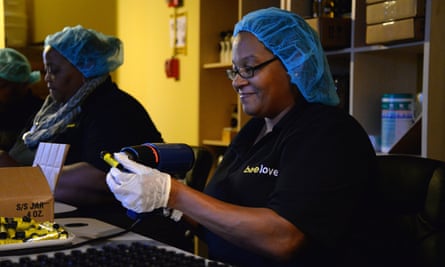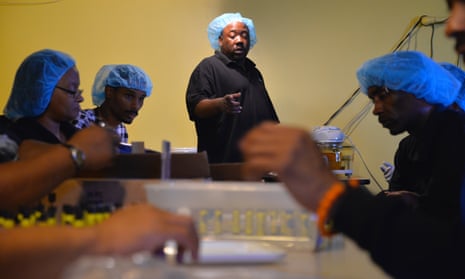Reggie Davis was only nine years old when he started selling drugs, before living the next three decades in and out of prison.
His story isn’t uncommon in Chicago’s North Lawndale neighborhood, where unemployment is almost triple the city’s average. More than one-third of households are below the poverty line, and more than half of the neighborhood’s adults have had some involvement with the criminal justice system.
But Reggie’s story is also part of a rapidly growing group of North Lawndale residents who are turning their lives around.
“I proved them wrong,” Davis, 41, said. “I proved everybody in my neighborhood wrong. Everybody thought I was going to come back to the streets. I proved everybody wrong.”
Davis works at Sweet Beginnings, an operation that employs residents returning home from prison as beekeepers.
Workers make high-end, artisanal honey and honey-infused skincare products. Of the more than 400 people who have worked at Sweet Beginnings over the past 10 years, less than 4% relapse into criminal activity – well below the national recidivism rate of 65%.
“I thought I was never going to get a job,” Davis said. “I thought I was shot. But they accept me with open arms. This like my second family here.”

Sweet Beginnings is the brainchild of Brenda Palms Barber – the “queen bee”, as Davis calls her. “It was always about jobs and creating jobs,” Palms Barber said. “And now we sit at this intersection of being environmentalists, and being conscious of health and food, knowing that what you’re putting on your skin matters, and social justice issues.”
Ten years ago, Palms Barber was trying to come up with a business plan that could work as a transitional first job for community members returning from incarceration. A friend suggested beekeeping – an idea that Palms Barber thought crazy. But she looked into it, talking to beekeepers and learning how the business works.
“It just started to make sense,” Palms Barber said. “It isn’t about beekeeping as much as it is about becoming acclimated to work – punching the clock. But the beauty of beekeeping is that it is so different that it becomes a game changer.”
Sweet Beginnings got its seed money from the Illinois department of corrections. Palms Barber conservatively estimated that 80% of Sweet Beginnings’ workers find permanent jobs after their time in the program is up. The business now employs 40 people a year, cycling through 90-day quarters, 10 employees at a time.

“Who would’ve imagined me, out of all people, working with bees?” said LaTonya Sykes, who has been working at Sweet Beginnings since July. “Working with bees and then extracting honey and then using that very same honey to make skincare products … I never knew.”
“I have grandchildren that’s growing up who are looking at me, and I didn’t want it to always be, you know, somebody asking where their grandparent is, and the answer always is ‘in jail’,” she added. “The answer’s different now. ‘Where’s your grandmamma at? Oh, she’s at work.’”
Something special happens at Sweet Beginnings, Palms Barber said. It creates a sense of self-worth, while “prison is all about stripping you of that”. Davis, Sykes and others have somewhere to be every morning where they are needed – where they are producing something and can take their families to the grocery store to show them what they made.
“There aren’t any worthless bees,” Palms Barber said. “And I think that is a beautiful metaphor as to how we can operate as a society. Everybody has a role to play, and everybody wants to be able to contribute.”
Since Sweet Beginnings began operating a decade ago, the business has expanded to more than 100 hives spread across the city – including more than 70 at an apiary on unused land at Chicago O’Hare international airport.
This year, Sweet Beginnings turned its first profit and is in the midst of renovations that will nearly double its workspace.
“I’m blessed. I wake up every morning about to cry,” Davis said, talking about his children and the pride they have in him. “Just imagine what these bees will do for the next person.”
“I have a purpose now,” Sykes said. “I was miserable. I wasn’t doing anything with my life. Walking up and down the streets, coming in different times at night. Staying away from my children because I was rippin’ and runnin’ the streets.”
Reflecting on her work, Palms Barber said: “It’s uncanny at times – people are afraid of bees, people are afraid of people who have been incarcerated. But the colony [is] working as a community. And I think that’s what re-entry looks like: finding your place and being productive.
“And,” she added: “doing your part to produce something sweet and good.”

Comments (…)
Sign in or create your Guardian account to join the discussion